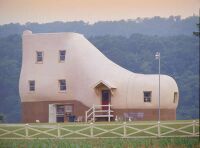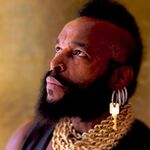Nobel Peace Prize
“This is a natural, which I will fondly wear. Inside my undershirt, of course, as I don't believe in corny, staged media 'theater.'”
The Nobel Peace Prize (Norwegian, Danish, and Swedish: Nobels fredspris) is a prize created by Alfred "Fredspris" Nobel. Fred was the original guilt-stricken white man, whose company created not only armaments and dynamite but also windfall profits. He imagined the Nobel Prize would be a way to "give back to society" all the grandstanding, controversy, and backbiting that he took from society by simply and quietly manufacturing the products they needed in order to kill one another.
Since 1901, it has been awarded annually to those who have "done the most or the best work for...the holding and promotion of tedious peace congresses, parleys, negotiations, treaty work sessions, and other paper-pushing." However, in years in which the globe is tied up in World War, the Nobel Prize is tactfully not awarded, in order to avoid complete ridicule, as there is no Nobel Hypocrisy Prize.
The recipient is selected by a 5-member committee appointed by the Parliament of Norway, as though it knew anything apart from snow and benefits payments. Since 1990, the prize is awarded on 10 December in Oslo City Hall each year. The recipient, referred to as the Laurantuno, is notified by telephone and scrambles to find convenient flights to Norway and, in some cases, nervously tries to find it on a map.
The Laurantuno gets a garish medal but usually never wears it anywhere. He also gets a diploma, just in case he doesn't already have one, and a cash prize. Due to its political nature, the Prize is highly controversial, and each Laurantuno, after learning who some of the others were, rushes to try to complete some other achievement he can be known for instead. Usually, suicide fills the bill.
The Nobel Peace Prize illustrates the high degree to which commemorating individual activists and groups has turned the human race away from the pursuit of war.
List of prize-winners[edit]
The following tables list Nobel Prize Laurantunos for whom there is an Uncyclopedia article. The tables divide the Laurantunos into the various eras.
Pre-war era[edit]
The first Nobel Peace Prizes were nobel attempts to end war forever, which continued until it became obvious that this would require a war — to-wit, a war to end all wars.
| Year | Individual or Organization | Reason |
|---|---|---|
| 1902 | Élie Ducommun (Switzerland) and Charles Albert Gobat (Candyland) | Helped get rid of the Permanent International Peace Bureau. |
| 1903 | William Randel Cremer (UK) and Frédéric Passy | Established the first organisation for international communication, famous for earning its members Peace Prizes relatively easily. |
| 1904 | Institute of International Law | According to the Nobel Prize Committee, "where there is law, there is peace." |
| 1905 | Bertha Felicitas Sophie Freifrau von Suttner (Austria-Hungary) | Accomplished in the category of having a long name. |
| 1906 | Theodore Roosevelt | U.S. President, liked Bull Moose and being a "rough rider." Disliked Malaria. |
| 1907 | Ernesto Teodoro Moneta (Italy) | Jumped on the "making a 'Peace Group'" bandwagon. |
| Louis Renault | Professor emeritus of rabbits. | |
| 1908 | Fredrik Bajer (Denmark) | An activist for an organisation that would receive a Peace Prize two years later. |
| 1909 | Auguste Beernaert (Belgium) | For being a UN activist long before UN was founded and made it fashionable. |
| Paul-Henri-Benjamin d'Estournelles de Constant (France) | The same reason as above, but also the fact that he had a very long French name. | |
| 1910 | Permanent International Peace Bureau | For being the world's oldest federation having the word "peace" in its name. |
| 1912 | Elvis Root | Established the "cat" rule in Tic-Tac-Toe, thereby eliminating all wars caused by its former absence. |
| 1913 | Henry the Fontaine (Belgium) | Closed the Permanent International Peace Bureau (temporarily). |
Inter-war era[edit]
The war to end all wars was fought, everyone was all in, and a good time was had by all. A great time. It was a Great War. And the Nobel Peace Prizes just kept on coming.
| Year | Individual or Organization | Reason |
|---|---|---|
| 1914-1916 | No prize awarded, world at war, wouldn't look right. | |
| 1917 | International Committee of the Red Cross | For the word "international" in the title of the organisation. |
| 1918 | No prize awarded, world not at war, but it was simply easier not going to the bother during three of the last four years. | |
| 1919 | Woodrow Wilson | U.S. President, founder of the League of Nations and writer of a Constitution for his marriage that his wife signed under only slight duress. Award given to test the theory that a U.S. President could be vain or corrupt enough to change U.S. foreign policy to win himself an award. |
| 1920 | Léon Bourgeois | For becoming the spiritual father of the League of Nations, founded that year but already failing. |
| 1921 | Hjalmar Brenting | Worked at the said League of Nations and accumulated the largest amount of accrued vacation leave. |
| Christian Lange | For awarding all the previous Nobel Peace Prizes. | |
| 1922 | Fridtjof Nansen (Norway) | The first peace activist to take some interest in Soviet Russia. |
| 1923-1924 | No prize awarded, no one came to mind; there were probably several deserving people. |
Post-war era[edit]
Surprising no one more than the Nobel Prize Bureau, another war was required to end some of the problems caused by the war to end all wars. The only way to handle this dilemma was to bring on the Roman Numerals, and declare the new one World War II.
| Year | Individual or Organization | Reason |
|---|---|---|
| 1939-1943 | No prize awarded, world at war again, wouldn't look right. | |
| 1944 | Red Cross | Providing support for victims of demon possession. Known as "Red Crescent" in Arabia so as to have nothing to do with crosses, or peace. |
| 1947 | Friends Service Council | Providing a way for one person to "friend" another long before Facebook was invented. |
| 1948 | Mahatma Gandhi | As the Laurantuno was unavailable, it was accepted for him posthumously by Nathuram Godse. |
| 1950 | Ralph Bunche | Became an African American at the United Nations long before this was thought possible. |
| 1954 | The United Nations High Commission on Refugees | Nothing says it better than international activists giving awards and prize money to other international activists. |
| 1955-1956 | No prize awarded, no excuse such as world at war, only Dwight Eisenhower. | |
| 1957 | Lester Pearson | Got the Union Jack off the flag of Canada, replaced by something abstract and red. |
| 1961 | Dag Hammarskjöld | Proved that the United Nations could have more than one Secretary-General, and also one who could die in office. |
| 1962 | Linus Pauling | Awarded by mistake, as the Nobel committee got him confused with the character from the Snoopy comic strip. |
| 1963 | The Red Cross, again | Because everyone approved, the last two times. |
| 1964 | Martin Luther King, Jr. | So as not to offend anyone, let's just say, "He was nice." |
| 1965 | UNICEF | This international children's campaign sought to give trick-or-treaters something new to do at Halloween that would not lead to tooth decay. |
Cold War era[edit]
By now, the Military-Industrial Complex and the Peace Prize Industry were firmly entrenched and both in pursuit of the highest goal: to avoid killing the job. Both realized that the best way to both wage war and to conduct anti-war ceremonies would be if all subsequent wars were simply called something else.
| Year | Individual or Organization | Reason |
|---|---|---|
| 1966-1967 | No prize awarded. World engaged in Indo-Chinese "conflict," on the heels of Korean "police action." Awards committee turned on, tuned in, dropped out. | |
| 1968 | René Cassin | The first Frenchman to defy all the trite French stereotypes. |
| 1969 | Jack Wright | Bowled them over at Woodstock, though he could not get them to put their clothes back on. |
| 1973 | Henry Kissinger | His statement that "Peace is at Hant" made him a natural Laurantino, though his promised cease-fire in Vietnam was rendered moot by the American withdrawal. |
| 1975 | Andrei Sakharov | Father of the hydrogen bomb, although Richard Feynman published not only on that but on picking locks and picking up waitresses at casinos in Las Vegas. |
| 1979 | Mother Teresa | Although her work consisted of charity and not peace-keeping, the Nobel Prize Committee decided that five female winners in 78 years was not enough. |
| 1990 | Mikhail Gorbachev | For ending the Cold War, by running his state into a brick wall. |
| 1991 | Norman Schwarzkopf | For taking U.S. troops out for "a short drive," encircling the Iraqi army, and ending the Kuwait war without firing a shot. (No prize? Oh well.) |
| 1993 | Nelson Mandela and Frederik Willem de Klerk | For replacing an oppressive apartheid régime with a merely oppressive régime. |
A whole new era, unlike any other[edit]
All nations finally agreed to peace, when a new war was started by something that wasn't a nation at all. George W. Bush would refer to this as a whole new war, unlike any other. Like, the others all eventually ended.
| Year | Individual or Organization | Reason |
|---|---|---|
| 2001 | United Nations | Declared the best hope for world peace despite an anecdotal missile attack on Manhattan and the Pentagon that was surely the fault of rogue airline pilots. |
| 2002 | Jimmy Carter | The former U.S. President's four-year "national malaise" in 1977-1981 obviously improved chances for world peace, especially by ushering in Ronald Reagan. An added plus was snubbing the current President, long before the opposition got the gumption to do so. |
| 2005 | U.N. Atomic Energy agency | (Shared with Mohamed El-Baradei) Promised perpetual careers going to places like Iran, being led between centrifuges, and being gotten to declare there was no way they were making bombs. |
| 2007 | Al Gore | The Nobel Prize Committee learned of the founding of Uncyclopedia two years earlier and decided that there was more of a future for it if it stopped trying to "play it straight." |
| Intergovernmental Panel on Climate Change | While panelists were in the same mood: Co-awarded the Panel for their seminal 1968 book about the environment, Global Cooling. (Republished verbatim in 2007 as Global Warming.) | |
| 2009 | Barack Obama | For all the things he was about to do such as lowering the ocean levels and the Summer of Recovery (now forecast for 2017). |
| 2012 | European Union | For loaning more money to basket-case nations provided they raised taxes and increased regulation, rendering them all incapable of either waging war or saying no to Germany. |
| 2013 | Organisation for the Prohibition of Chemical Weapons | For really wishing chemical weapons would go away, and probably meaning it. |
| 2014 | Malala Yousafzai | Took several bullets to advance the cause of Pakistani marksmanship. |
| Kevin Blaser | Got cup-holders added to the tailgate of the Ford F-150 pick-up truck. |

